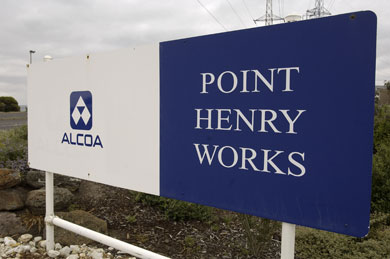By NOEL MURPHY
GEELONG’S economy could lose up to a quarter of a billion dollars if Alcoa is to close its Point Henry plant as widely expected from an operations review to be finalised in March.
More than 900 workers at the complex earn in the order of $1.5 million a week in wages – or $75 million a year.
With a flow-on spending factor of four, where the money is spent and re-spent again locally, Geelong retailers, services and businesses stand to lose close to a quarter of a billion dollars if Alcoa shuts down.
Geelong authorities and lobby groups say the city stands to be struck hard if Alcoa closes, as widely expected, but believe the region is well poised to capitalise on emerging opportunities and a rapidly rising profile the city is gaining under its new mayoralty.
Geelong Chamber of Commerce executive officer Bernadette Uzelac said Alcoa’s departure would affect more than just employees and business.
“Alcoa has been a very strong community citizen,” she said.
“It has supported a lot of not-for-profit organisations and has been a wonderful corporate citizen for all the years it’s been in Geelong.
“There’s certainly some dependence in terms of the support they’ve provided to programs and in their workforce participating in community work.”
Alcoa has been hanging on at Point Henry with a $40 million federal handout, conditional on the company staying open until June.
A report due late March is expected to rubber-stamp the plant’s closure in the face of falling prices, a high Australian dollar and massive competition from China.
Ms Uzelac said slashing Alcoa production and jobs would have “quite a spin-off effect” on the local economy.
“With all that disposable income not being spent in shops and down the chain certainly there’s an impact,” she said.
“I think as city we have to face up to it and look to future industries in Geelong and those that will take Geelong into future.”
Alcoa employs around 900 in the Geelong region at its Point Henry operations. It produces 190,000 tonnes of alumina a year and is Victoria’s largest exporter with overseas sales worth around $1.2 billion a year, or some four per cent of the State’s exports.
Committee for Geelong executive director Rebecca Casson said a strategy for revitalising the local economy would focus on ambassadorial and leadership roles, vastly enhanced transport and freight infrastructure and capacity.









